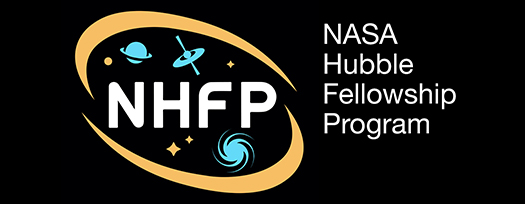For Release: March 25, 2022
NASA

NASA has selected 24 new Fellows for its prestigious NASA Hubble Fellowship Program (NHFP). The NHFP is one of the highlights of NASA's pursuit of excellence in astrophysics. The program enables outstanding postdoctoral scientists to pursue independent research in any area of NASA Astrophysics, using theory, observation, experimentation, or instrument development. Nearly 450 applicants vied for the 2022 fellowships. Each fellowship provides the awardee up to three years of support.
Once selected, Fellows are named to one of three sub-categories corresponding to three broad scientific questions NASA seeks to answer about the universe:
- How does the universe work? — Einstein Fellows
- How did we get here? — Hubble Fellows
- Are we alone? — Sagan Fellows
"From the quest for the first galaxies to the hunt for habitable exoplanets, this year's NASA Hubble Fellows seek answers to some of the most critical questions about our universe," said Paul Hertz, Astrophysics Division director at NASA Headquarters in Washington, D.C. "This is an incredibly promising group of young scientists, and I can't wait to see where their research takes them from here."
The newly selected NHFP Fellows will begin their programs in the fall of 2022 at a university or research center of their choosing in the United States. The list below provides the names of the 2022 awardees, their fellowship host institutions, and their proposed research topics.
2022 NASA Hubble Fellowship Program:
How does the universe work? — Einstein Fellows:
- Riccardo Arcodia, Massachusetts Institute of Technology, The Awakening of Massive Black Holes
- Jessica Avva, University of Chicago, Line Intensity Mapping With mm-wave Spectrometers: Targeting a New Cosmological Observable
- Tarraneh Eftekhari, Northwestern University, Illuminating the Progenitors and Environments of Energetic Transients With Radio Observations
- Kyle Kremer, California Institute of Technology, Modeling Black Hole Dynamics in Dense Star Clusters
- Hayley Macpherson, University of Chicago, Precision Cosmological Modelling in Nonlinear General Relativity
- Bart Ripperda, Institute for Advanced Study, Multiwavelength Flares in the High-Energy Universe
- David Vartanyan, Carnegie Observatories, Mapping the Signatures of Shock Breakout
How did we get here? — Hubble Fellows
- Elias Aydi, Michigan State University, Combining Observations With Simulations to Decipher Shocks in Novae
- Emily Cunningham, Columbia University, Testing Galaxy Formation Models With Large-Scale Surveys of the Milky Way Stellar Halo
- Seiji Fujimoto, University of Texas Austin, Decoding a Rosetta Stone for Galaxies at the Epoch of Reionization With JWST and ALMA
- David Guszejnov, Harvard University, The Role of Physical Processes and the Environment in Star Formation
- Sultan Hassan, Princeton University, Illuminating the Primeval Universe With Lyman-alpha
- Kartheik Iyer, Columbia University, Constraints on Galaxy Evolution Using Star Formation Histories
- Tharindu Jayasinghe, University of California Berkeley, Unveiling the Hidden Population of Black Holes in Our Galaxy
- Arianna Long, University of Texas Austin, The Role of Dark Matter in Growing and Quenching the First Massive Galaxies
- Rohan Naidu, Massachusetts Institute of Technology, The First Glimpse of the First Galaxies: A Near and Far Approach
- Kathryn Neugent, Harvard University, Red Supergiant Binaries on the Path to Becoming Gravitational Wave Events
- Joel Ong, University of Hawaii, Constraining Post-Main-Sequence Angular Momentum Evolution With Mixed-Mode Asteroseismology
Are we alone? — Sagan Fellows
- Fei Dai, California Institute of Technology, Probing Planet Formation With the Most Extreme Cases
- Feng Long, University of Arizona, Disk Substructures and the Act of Planet Formation
- Ryan MacDonald, University of Michigan, A Multidimensional Approach to Exploring Disequilibrium Chemistry in Exoplanet Atmospheres
- Gudmundur Stefansson, Princeton University, The Diversity and Orbital Architectures of Planets Orbiting Cool Stars
- Michael Wong, Carnegie Earth and Planets Laboratory, Assessing the Network Topologies of Planetary Atmospheres for Potential Biosignatures
- Zhoujian Zhang, University of California Santa Cruz, Probing the Formation of Directly Imaged Exoplanets via Robust Atmospheric Characterization
An important part of the NHFP is the Symposia, which allow Fellows the opportunity to present results of their research, and to meet each other and the scientific and administrative staff who manage the program. A lively and very successful virtual symposium was held in the fall of 2021, and organizers are waiting to make a decision on whether the 2022 symposium will be virtual or in-person.
The Space Telescope Science Institute administers the NHFP on behalf of NASA, in collaboration with the Chandra X-ray Center at the Smithsonian Astrophysical Observatory in Cambridge, Massachusetts, and the NASA Exoplanet Science Institute at Caltech/IPAC in Pasadena, California.
Short bios and photos of the 2022 NHFP Fellows can be found at:
https://www.stsci.edu/stsci-research/fellowships/nasa-hubble-fellowship-program/2022-nhfp-fellows.
Media Contact:
Cheryl Gundy
Space Telescope Science Institute, Baltimore, Maryland
410-338-4707
gundy@stsci.edu


